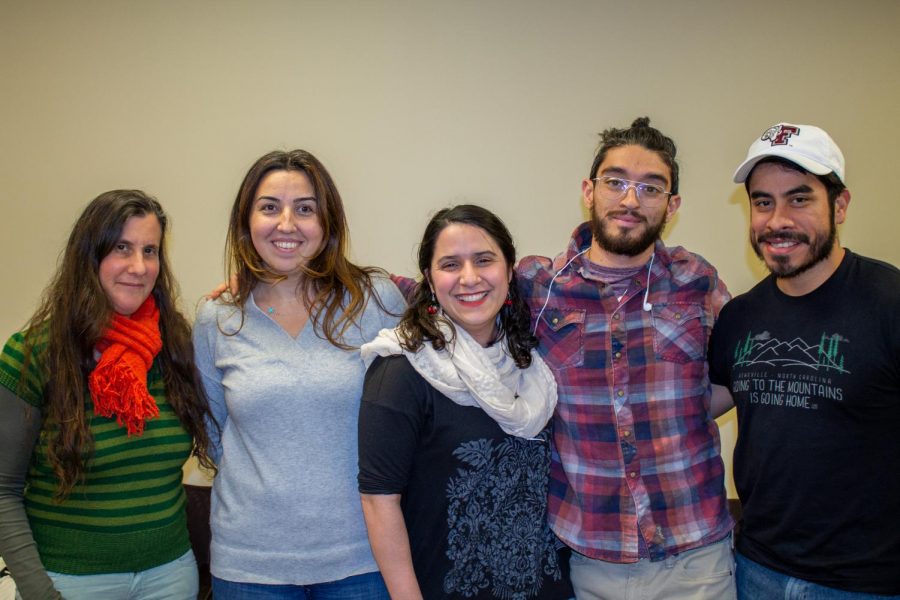Veterans’ Center Just In Time for Veterans Day
ISABELLE DALBY/THE OBSERVER
Fordham’s new Veterans Center is an opportunity for student-veterans and civilian students to connect.
November 12, 2019
Veterans Day is the holiday on which we honor our vets, but it can be hard to honor a group without knowing who they are. So, what do we think of when we hear the word “veteran”? It’s easy to imagine grandparents who served in some distant war, or of elderly men wearing uniform caps weighed down with medals and regalia from their days of service. It’s easy to brush off the term “veteran” as the label of a peak that has long since passed — or as part of a holiday we celebrate once a year and let fade into the background until next November.
But veteran is a modern word too, encompassing the recently discharged service members of a younger and more contemporary generation. Fordham has over four hundred student veterans in every major and school across the board. Our veterans are men and women who, like their traditional student counterparts, are investing in their future, but uniquely so, as they are also adjusting back into civilian life.
Fordham is an interesting university at which to be a student veteran: St. Ignatius of Loyola was a military man before he left that life behind him to found the Society of Jesus. Like St. Ignatius, most student veterans at Fordham have left behind our military lives to pursue higher learning — and try to affect our own sense of “cura personalis” through whichever major we pursue. During this time of changing values, engagement with the non veteran population is key to easing the transition. Traditional Fordham students have a handle on the rhythm of civilian and student life that makes them all perfect allies for their student veteran community. There’s endless common ground between us.
But while Fordham student veterans are just as passionate as other students about pursuing their interests in everything from photography and filmmaking to start-ups and nonprofits, their military-to-civilian transition demands that student veterans lean heavily on their military identity, almost ridiculously so. Former service members must confront their veteran status when they register for class with the Department of Veterans Affairs each semester, when they apply for health care via their military benefits and when they pay for their NYC housing with their G.I. Bill stipend.
Student-veterans’ financial, medical and academic standing all revolve around that veteran status. It’s no surprise, then, that their social circles follow suite. When universities create systems catering to the unique ecosystem of student-veteran needs, student-vets tend to become isolated from the non-veteran community — despite sharing countless hobbies and interests.
This semester, a new fully-functioning veteran center recently opened in room 145 of the 140 West Building on the Lincoln Center campus to continue to serve Fordham student veterans. While it will undoubtedly be an improvement in the lives of the student veteran community, I think this veteran center can bridge the divide between student veterans and traditional students.
This vet center facilitates and advocates for all the aforementioned aspects of student veteran life (academic, fiscal and medical), but the center is also a physical place for community. Matt Butler, Fordham’s director of Military and Veteran Services, said, “Many of our veterans are not far removed from the traditional-aged student. There are many things that can be learned by having a robust interactive and inclusive community of veterans and non-veterans on campus. Service and fellowship with each other will produce a richer experience and produce greater outcomes for everyone involved.”
Until now, Fordham student veterans haven’t had an adequate physical space to build community, but the center can now be a place of community for not only student-vets, but the rest of Fordham too. Butler agreed, “Most veterans have a desire to serve others once they leave the military. Their individual experiences give them a wide range of perspectives on the world, that they are willing to share. Much like any immersion experience in other countries, learning about other people’s culture and conditions are excellent learning opportunities.”
I would implore traditional students to pop in and get to know their student veteran counterparts. Student veterans and traditional students share countless interests. Are you a senior with questions about joining the military after graduation? Come ask about the culture at the veteran center — they’ll answer your questions and maybe share some hard truths. Are you writing a sociology paper and referencing Navy culture without first hand experience? Come interview a veteran sailor at the vet center. Did you write a play about a soldier, but you don’t know if you nailed realistic military dialogue? Let a student veteran read it for you.
There is synergy between these communities waiting to build. Student veterans have life experiences that can enrich traditional classes by adding to the beautiful diversity of voices in a classroom. Traditional Fordham students are creative and driven and will be out in the workforce right alongside student veterans. Traditional students can support student veterans by bringing them into their communities, clubs, friend groups and creative circles. Engagement is support. Being needed or included is being honored. And time and exposure to additional communities beyond student veteran-oriented ones can only help student veterans in their transition back into civilian life.
Supporting veterans doesn’t have to stay a weeklong affair. It can be a lifestyle choice. A high tide floats all ships, as they say.










